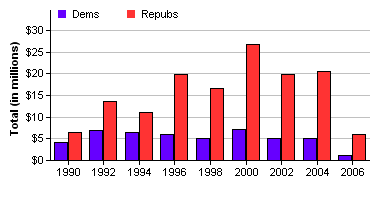Can a Republican Congress Face Its Responsibilities?
In terms of imminent, meaningful action by the Congress, however, the question of whether the president should be impeached (or, less severely, censured) remains premature. More important, it is essential that the Senate vote—hopefully before the November elections, and with overwhelming support from both parties—to undertake a full investigation of the conduct of the presidency of George W. Bush, along the lines of the Senate Watergate Committee's investigation during the presidency of Richard M. Nixon.
How much evidence is there to justify such action?
Certainly enough to form a consensus around a national imperative: to learn what this president and his vice president knew and when they knew it; to determine what the Bush administration has done under the guise of national security; and to find out who did what, whether legal or illegal, unconstitutional or merely under the wire, in ignorance or incompetence or with good reason, while the administration barricaded itself behind the most Draconian secrecy and disingenuous information policies of the modern presidential era.
"We ought to get to the bottom of it so it can be evaluated, again, by the American people," said Senator Arlen Specter of Pennsylvania, the Republican chairman of the Senate Judiciary Committee, on April 9. "The President of the United States owes a specific explanation to the American people … about exactly what he did." Specter was speaking specifically about a special prosecutor's assertion that Bush selectively declassified information (of dubious accuracy) and instructed the vice president to leak it to reporters to undermine criticism of the decision to go to war in Iraq. But the senator's comments would be even more appropriately directed at far more pervasive and darker questions that must be answered if the American political system is to acquit itself in the Bush era, as it did in Nixon's.
Perhaps there are facts or mitigating circumstances, given the extraordinary nature of conceiving and fighting a war on terror, that justify some of the more questionable policies and conduct of this presidency, even those that turned a natural disaster in New Orleans into a catastrophe of incompetence and neglect. But the truth is we have no trustworthy official record of what has occurred in almost any aspect of this administration, how decisions were reached, and even what the actual policies promulgated and approved by the president are. Nor will we, until the subpoena powers of the Congress are used (as in Watergate) to find out the facts—not just about the war in Iraq, almost every aspect of it, beginning with the road to war, but other essential elements of Bush's presidency, particularly the routine disregard for truthfulness in the dissemination of information to the American people and Congress.
I suspect a bipartisan investigation is unlikely in the near term since there are so many Republicans themselves in the current Congress who warrant investigation. But the responsibility of Congress to begin those investigations couldn't be any more clear.






